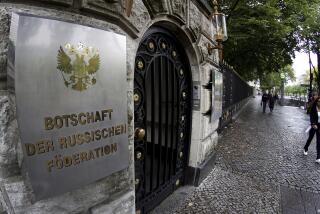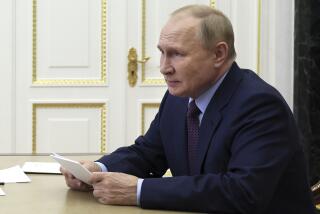U.S. Accuses Soviets of Planting ‘Bugs’ in Leningrad Consulate
- Share via
WASHINGTON — In an incident sure to add new friction to the superpower rivalry, the U.S. government Friday accused the Soviet Union of planting electronic listening devices in the U.S. Consulate in Leningrad.
The State Department said the bugs, which apparently had been in place for years, were discovered in February during a security inspection.
“Such hostile attempts at intelligence gathering--however long ago they may have been initiated--are deeply resented by the American people,” the department said in a statement to reporters.
The consulate, which opened in 1973, handles relatively low-level diplomacy, such as assisting U.S. businessmen and interceding on behalf of Americans who run into trouble with Soviet law. For this reason, the Soviet eavesdropping is considered to be less damaging than electronic surveillance at the embassy in Moscow.
In 1985, the State Department said that a new embassy building in Moscow was honeycombed with sophisticated listening devices. As a result of the discovery of the bugs, the U.S. government refused to move into the embassy from a dilapidated building nearby.
U.S. Steps Due
Secretary of State James A. Baker III is expected to announce soon the steps the U.S. government will take to assure itself that officials’ conversations in the Moscow embassy will be private. Recommendations range from tearing down the building and starting over, to a partial reconstruction of the most sensitive areas of the facility. The cost of demolishing and rebuilding the embassy has been estimated at $500 million.
Officials said they believe the consulate can be made secure without such extreme measures.
The State Department announced Friday that Baker would visit Moscow May 10-11 for talks with Soviet Foreign Minister Eduard A. Shevardnadze.
Although the eavesdropping devices at the consulate apparently were left over from an earlier and harsher period of the Cold War, their discovery now is likely to produce new U.S.-Soviet tensions.
The Bush Administration has already signaled a more wary approach to the Soviet Union than was prevalent in the final years of the Ronald Reagan Administration.
The relationship has been buffeted in recent weeks by the revelation that the Soviet Union has sold high-performance warplanes to Libya and by continuing disputes over Latin America.
More to Read
Sign up for Essential California
The most important California stories and recommendations in your inbox every morning.
You may occasionally receive promotional content from the Los Angeles Times.













